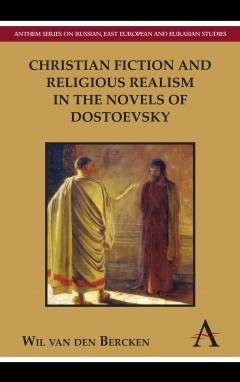Christian Fiction and Religious Realism in the Novels of Dostoevsky
By Wil van den Bercken
Anthem Series on Russian, East European and Eurasian Studies Anthem Nineteenth-Century Series
Other Formats Available:
- About This Book
- Reviews
- Author Information
- Series
- Table of Contents
- Links
- Podcasts
About This Book
This study offers a literary analysis and theological evaluation of the Christian themes in the five great novels of Dostoevsky - 'Crime and Punishment', 'The Idiot', 'The Adolescent', 'The Devils' and 'The Brothers Karamazov'. Dostoevsky's ambiguous treatment of religious issues in his literary works strongly differs from the slavophile Orthodoxy of his journalistic writings. In the novels Dostoevsky deals with Christian basic values, which are presented via a unique tension between the fictionality of the Christian characters and the readers' experience of the existential reality of their religious problems.
This study is based on a balanced method of literary analysis and theological evaluation of the texts, avoiding free theological association as well as hermeneutical mixing with the non-literary writings of Dostoevsky. The study starts by discussing the main recent studies of Dostoevsky's religion. It then describes Dostoevsky's original literary method in dealing with religious issues - his use of paradoxes, contradictions and irony. 'Christian Fiction and Religious Realism in the Novels of Dostoevsky' ultimately deconstructs Dostoevsky as an Orthodox writer, and reveals that the Christian themes in his novels are not ecclesiastical or confessionally theological ones, but instead are expressions of a fundamentally Christian anthropology and biblical ethics.
Reviews
‘[This] sparklingly written book […] is a refreshing exception […] by its departure from an original literary analysis and struggle against biased interpretations […Van den Bercken] has with verve succeeded in demonstrating the importance that theology – if practiced in a selfcritical way – can have for the science of literature.’ —Pieter Boulogne, ‘Tijdschrift voor Theologie’
‘A gift to Dostoevskii scholars [that enriches] our understanding of the essential religious dimension of Dostoevskii’s work.’ —Paul J. Contino, ‘Slavic Review’
‘Van den Bercken’s monograph impresses with the breadth of fictional and critical material analysed, and the huge amount of analytic work which such a mammoth task entails.’ —Slobodanka Vladiv-Glover, ‘The Dostoevsky Journal: An Independent Review’
Wil van den Bercken has produced a focused and sober re-consideration of the vexed question of the religious identity of Dostoevsky’s fiction… In a series of patient and perceptive analyses of Dostoevsky’s major novels, van den Bercken extracts their religious content and assesses it without preconceptions. ‘Christian Fiction and Religious Realism in the Novels of Dostoevsky’ should appeal not only to specialists in Dostoevsky and modern fiction, but also to students and general readers.' —Robert Bird, University of Chicago
Author Information
Wil van den Bercken is a Slavist and professor of the history of the Russian Orthodox Church at the Radboud University in Nijmegen (The Netherlands). His publications include 'Ideology and Atheism in the Soviet Union' (1988), 'Holy Russia and Christian Europe: East and West in the Religious Ideology of Russia' (1999) and 'Aesthetics as a Religious Factor in Eastern and Western Christianity' (ed., 2005). He is editor-in-chief of the 'Journal of Eastern Christian Studies'.
Series
Anthem Series on Russian, East European and Eurasian Studies
Anthem Nineteenth-Century Series
Table of Contents
Introduction; Religious Interpretations of Dostoevsky; The Realism of Dostoevsky’s Fictional Christianity; Christian Themes in ‘Crime and Punishment’; Religious Discussions in ‘The Idiot’ and ‘The Adolescent’; Christian Voices in ‘The Devils’; The Spirituality of the Monk Zosima in ‘The Brothers Karamazov’; The Legend of the Grand Inquisitor: Literary Irony and Theological Seriousness; Dostoevsky’s ‘Grand Inquisitor’ and Vladimir Solovyov’s ‘Antichrist’; Physical and Divine Beauty: The Aesthetical-Ethical Dilemma in Dostoevsky’s Novels; Conclusion; Notes; References; Index of Names
Links
Stay Updated
Information
Latest Tweets



